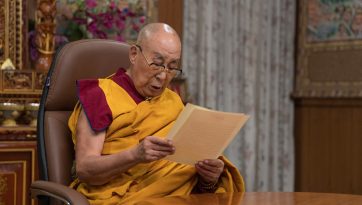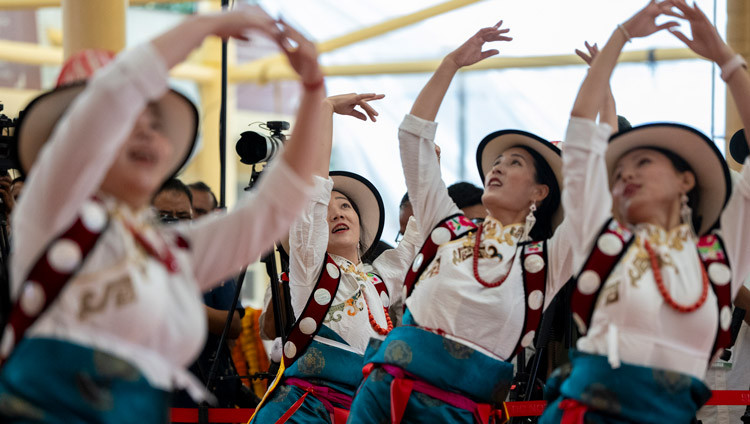Kind and Compassionate Leadership
January 27, 2021
Thekchen Chöling, Dharamsala, HP, India – Once His Holiness the Dalai Lama had taken his seat in front of the cameras at his residence this morning, he was welcomed to a virtual conversation on ‘Kind and Compassionate Leadership’ by Sasha Havlicek. As CEO, Institute for Strategic Dialogue, she explained that the organization she leads has been working to oppose hate and misinformation.
With this in mind it launched the Strong Cities Network (SCN) to work to overcome polarization and extremism. It has delivered training to city officials, civil society leaders, company leaders and faith leaders in deradicalization and reintegration, particularly aiming to break down the concept of ‘othering’, the habit of seeing people in terms of ‘us’ and ‘them’.
Today’s event was the result of partnership between SCN and the United States Conference of Mayors (USCM) led by Louisville Mayor Greg Fischer. Havlicek thanked His Holiness for his participation today and introduced Mayor Fischer as today’s moderator.
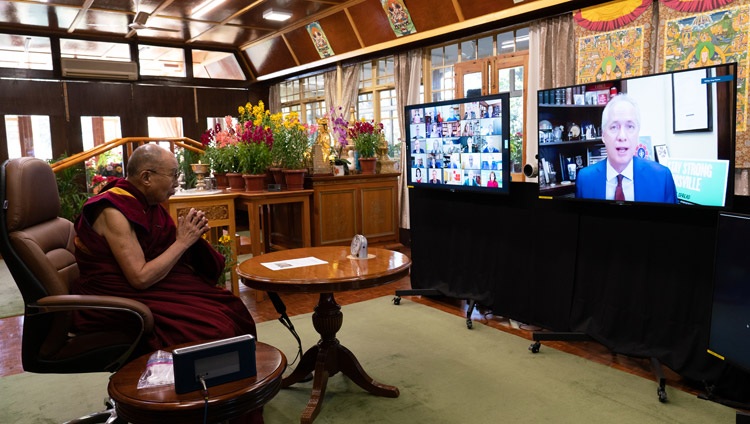
Mayor Fischer professed it was an honour to be with His Holiness once more. He thanked Sasha Havlicek and Tom Tait, former Mayor of Anaheim for bringing together 74 mayors representing 19 countries. He stated that we can rise above challenges when we embrace compassion.
With his opening words, His Holiness declared that, whenever he can, he emphasizes the oneness of humanity. “We are all the same as human beings,” he went on. “Scientists recognise that we are social animals with a strong sense of community. We depend on each other and we take care of each other for our very survival.
“We face many problems, many of which are our own creation. But we limit ourselves by thinking too much of me, of my needs, my family’s needs, the needs of my community and the needs of my nation. However, since we are responsible for so many of the problems that confront us, it’s reasonable to think that we can also solve them.
“Above all, we must cultivate a sense of the oneness of all human beings. We must recognise that in comparison to that, differences of faith and of nationality are secondary.
“Like other animals we have an array of sense consciousnesses, but what sets us apart is our intelligence. We can consider and plan for the future. Today, we are all part of a global economy and, because of technological developments, the world is becoming smaller. We have to consider the needs of the whole world and the whole of humanity because we are all the same in being human. And we have to live together.
“I feel I am just another human being, a part of the world in which I live. Therefore, I’m never lonely. I think of whoever I meet as being the same as me. We don’t need to be introduced. If they have two eyes, one nose and a mouth, I think of other people as being human like me.
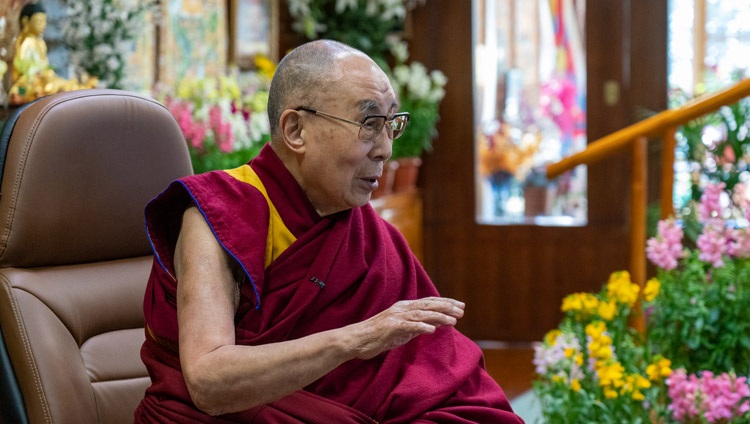
“When I first came to India, I reflected on the close links between this country and my homeland. As the Prime Minister has said, India is the land of the Buddha. And even today, we can benefit from adopting the tried and tested ancient Indian principles of ‘ahimsa’ and ‘karuna’, non-violence and compassion, as the basis of a more peaceful world.
“As I often say, to achieve world peace, we need peace of mind within ourselves. However, destructive emotions disturb our peace of mind. Those who concern themselves predominantly with material development think of happiness and well-being only in terms of physical health and yet our mental health is crucial too. Ancient Indian tradition acquired a rich understanding of the workings of our minds and emotions and we can still call on this knowledge today.
“It recommends first examining what disturbs the mind and then considering what counters those disturbances. It turns out that self-centred attitudes and misconceptions about the nature of self are at the root of the destructive emotions that disturb our minds. So, when we see, as quantum physicists have also observed, that things do not exist as they appear, our misplaced thoughts are reduced. And although this information is to be found in religious texts, it can definitely be redeployed in a secular, academic context. We can all learn how to tackle destructive emotions and cultivate positive qualities.
“We must try to incorporate understanding of the workings of our emotions and the ways to tackle them into our education system. If we are kind and compassionate, we’ll be honest. That leads to trust, stability and friendship. Now, do you have any questions?”
Mayor Fischer introduced Mayors of North American cities, as well as from other parts of the world who put their questions to His Holiness. Mayor Eric Garcetti, Los Angeles, began by asking how to heal division. His Holiness told him it’s important to focus on our feelings of closeness to one another. He noted that since America is regarded as leader of the free world, and has special relations with Europe, to think of ‘America first’ is inappropriate. America should take the whole world into account.
Mayor Maria Isabelle Climaco, Zamboanga, Philippines wanted to know what lessons we can learn from the pandemic. His Holiness told her first of all that he is very concerned about it and prays every day that the pandemic should come to an end. “I really admire the researchers who are investigating the virus, as well as the doctors and nurses who are caring for the sick, often putting their own health at risk. We have to learn from what the experts tell us. We have to follow their advice to be cautious, to wear masks and observe social distancing.”
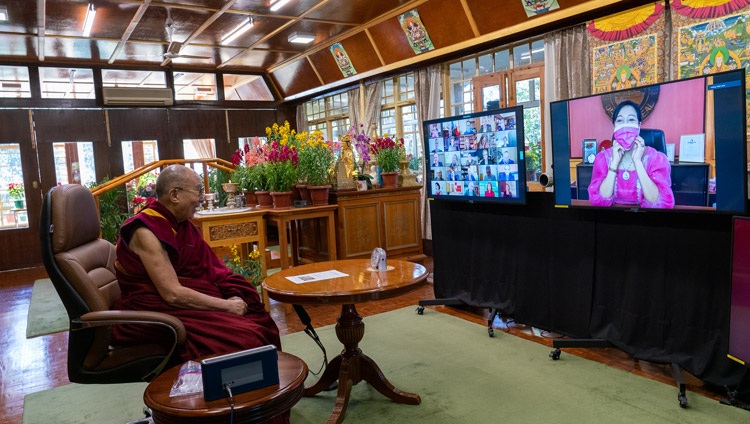
His Holiness told Mayor Andy Berke, Chattanooga, USA that people in local communities should work together. He mentioned his admiration for the spirit of the European Union (EU) where historic enemies have put the past behind them and chosen to cooperate with each other instead. He suggested that the rest of the world can learn from the EU’s experience and emphasize closeness rather than distance. The time has come to work together, to meet and discuss what needs to be done.
Councillor Sarah Hamilton, Edmonton, Canada sought guidance on ways to bridge the divides that have opened up in many places. His Holiness stated that biased views should give way to feelings of harmony and respect. He pointed out that all the world’s major religious traditions flourish peaceably, side by side in India. He added that as contact increases, the tendency towards isolation breaks down. He voiced a sense of optimism, suggesting that if religious and civic leaders, scholars and scientists met more often they could contribute to making things better.
Mayor Visar Ganiu, Skopje, North Macedonia asked how local government can help dispel disinformation about covid-19. His Holiness told him how necessary it is for experts to explain the situation in a truthful way. As the world becomes smaller, holding meetings for this purpose becomes easier.
Mayor Naheed Nenshi, Calgary, Canada sought advice about helping people live together better and also mentioned that this year will mark the 50th anniversary of the first Tibetans coming to Calgary. His Holiness acknowledged the need to address racism and rising hatred. He pointed out that when you look at things from a wider perspective it’s easier to focus on unity.
“Things are improving,” he declared, “but efforts to correct misunderstandings must continue through education and personal contact. The time for use of force has gone. Since no one can completely eliminate their enemies, we have to learn to live together. And it’s better that we live together happily with smiles on our faces.
“Canada was one of the first countries to accept a group of Tibetans and they are happy and well settled. People tell me that, in general, the local communities where Tibetans live admire them for their humility and hard work.”
Councillor Jørgen H. Kristiansen, Kristiansand, Norway enquired about links between war, conflict and poverty. His Holiness told him he thinks wars take place less for economic reasons than for political and ideological ones. He cited the Vietnam war as an example.
Although military conflict is reducing, His Holiness pointed out that poverty is not. He stressed the urgency of reducing the gap between rich and poor on both local and global levels. He mentioned a growing trend in support of denuclearization. Many people now envisage a world without nuclear weapons and the threat they present.
His Holiness told Mayor Bill Peduto, Pittsburgh, USA that wider contact was the only way to heal the divisions caused by self-righteous anger and hatred. Some foolish people may cling to divisive attitudes. They need to be helped to understand the reality of what we all have in common. His Holiness reiterated that frustration and confusion arise because of ignorance and that can be dispelled by education and sound information.
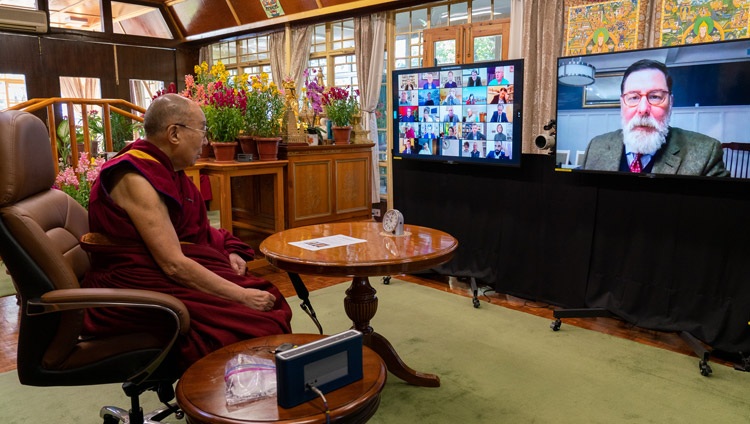
His Holiness agreed with Mayor Leoluca Orlando, Palermo, Italy about the importance of compassion and fraternity. So many problems humanity faces are rooted in a sense of ‘us’ and ‘them’. He observed that theistic religions like Judaism, Christianity and Islam consider that we all come from one creator so we are all like brothers and sisters. It’s a powerful idea linked to a message of loving kindness.
Non-theistic religions like Buddhism, Jainism and some Hindu traditions emphasize instead the importance of compassion. His Holiness remarked that we all need compassion because we all have to live together and help each other.
Mayor Greg Fischer thanked His Holiness for the inspiration he always provides. He also thanked Sasha Havlicek and the Mayors who had taken part in the conversation. He ended with something he’s learned from His Holiness: “If you want others to be happy, practise compassion. If you want to be happy, practise compassion.”
“I very much appreciate the work you are doing to promote compassion,” His Holiness responded. “Compassion is indispensable. We must also continually consider the oneness of humanity. I appreciate all the mayors who have joined us today. Although one individual’s ability to change the world may be limited, mayors, as community leaders can bring change about. This is a cause for hope. We must keep up our efforts. I look forward in this 21st century to seeing a happier world where everyone wears a joyful smile. Thank you.”
SOURCE:https://www.dalailama.com/news/2021/kind-and-compassionate-leadership





